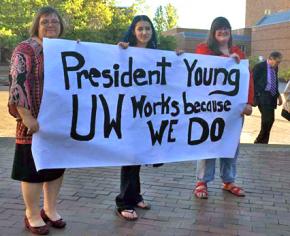UW contract deadline looms
reports on a contract fight at the University of Washington in Seattle.
THE CONTRACT fight for University of Washington (UW) workers in Seattle is heating up. State law requires a signed contract be presented to the governor by October 1 for funding, so the largest unions, Service Employees International Union (SEIU) Local 925 and Washington Federation of State Employees (WFSE) Local 1488, need to reach an agreement with UW by the end of September. The contract would go into effect July 1, 2015.
Outstanding issues include wages, working conditions, health and safety, and staffing issues. Hundreds of UW employees earn less than $15 per hour. Dozens of janitorial positions are unfilled, leaving custodians overworked and more prone to on-the-job accidents.
Speedups are a major issue for WFSE members, but also affect SEIU members, who have seen the elimination of hundreds of positions with no overall reduction in workload. Janitors especially oppose the "team cleaning" method, which results in speedups and more repetitive motion injuries.
So far, the university has offered little. In the contract covering 2013 to 2015, both unions received a 2 percent increase a year, after five years of no wage increases. This year, management is so far only offering 3 percent over two years.

UW is one of the richest education institutions in the U.S., with a multibillion-dollar endowment and top officials who make hundreds of thousands yearly. The state legislature, under Democratic Party control, cut the UW budget every year from 2008 to 2013.
This is the excuse management has given for low wage increases. But UW's total budget is only 16 percent funded by the state, and the grant funding with which many employees are paid includes cost-of-living increases, which the UW has not fully passed on to employees. Large parts of UW are " self-sustaining"--in other words, run like private businesses. Furthermore, UW students have seen massive tuition increases over the last several years.
ONE OF the most galling things to workers is the extremely low pay for sections of the workforce. In response to the unions' demand that all employees make a minimum of $15, management offered to bring everyone "up" to $12 per hour. This would have only raised the wages of 31 WFSE members and left hundreds of low-wage union members out in the cold.
Another issue that makes workers angry is the differential treatment of management, faculty and professional staff compared to union members. On July 1, when union members received a 2 percent increase under the old contract, professional staff, which includes some managers and faculty, got a 4 percent raise.
Since faculty and professional staff receive higher salaries to start with, the gap between them and union members widened significantly. Most upsetting is the issue of high salaries for management in the range of hundreds of thousands of dollars yearly while union workers get increases below the rate of inflation.
The unions have been engaged in a campaign to win a decent contract for months. WFSE has held several rallies highlighting the plight of custodians and other low-wage workers. SEIU is part of a campaign to raise state funding for education from kindergarten through college. It recently organized "donor actions," leafleting and picketing to convince UW donors to pressure management to give a decent contract.
On September 17, WFSE held a two-hour picket in front of UW's human resources offices while negotiations were going on. Union members were joined by students, SEIU members and other supporters chanting, "Hey, UW, you can't hide, we can see your greedy side!" and "What do we want? Fair contract! When do we want it? Now!"
This round of contract negotiations has seen much greater solidarity between the unions than has taken place in the past. Every action called by one union is supported by the other.
It's clear that UW management doesn't value its union workers. It feels that given continuing high unemployment, it can easily replace workers and doesn't need to give them the incentive of higher wages. Though there have been no definite plans made or any formal votes taken, more union members are at least bringing up the possibility of a strike.
The last strike by workers at UW was for one day in May 2001. It caught the attention of legislators who, in the face of a strike, raised their wage offer quickly. More workers are thinking that it may be time to remind management of the important work we do by showing them what it would be like if we didn't come to work.
Whether this happens or more likely does not, more pickets and other actions are planned as the contract deadline rapidly approaches.


